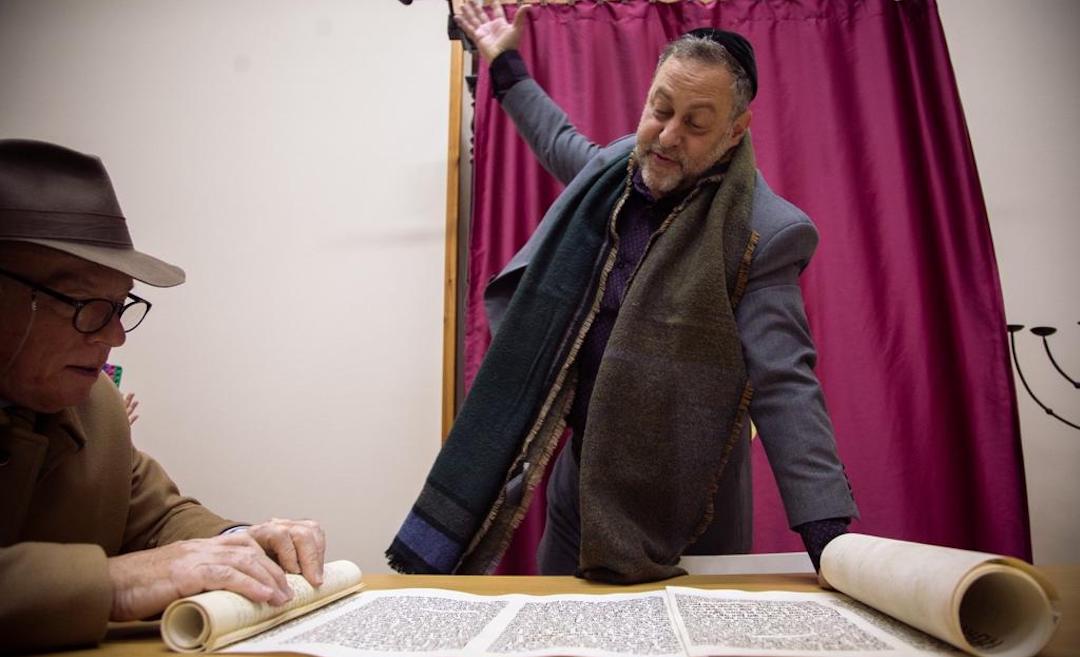CATANIA, Italy (JTA) — Rabbi Gilberto Ventura believes his synagogue has the most beautiful view in the world. Located in the tower of a century-old castle on the slopes of Mt. Etna in the eastern Sicilian city of Catania, the synagogue is wedged between a snow-capped volcano and the sun-kissed Mediterranean sea.
The 49-year-old Brazil-born rabbi also thinks his congregation is one of the most unique in the world. It’s made up mainly of Bnei Anusim — descendants of Jews forced to hide their religious practice and convert to Catholicism after the Spanish Inquisition of 1492. Before that infamous decree, Sicily was home to tens of thousands of Jews.
The synagogue, which was first inaugurated last fall, is the result of decades of grassroots efforts by those descendants in Catania to find each other and forge a sense of community that had been lacking for centuries.
Hiring a full-time rabbi was the last piece of the puzzle, and Ventura, who has a long history of working with communities of Bnei Anusim in Brazil, was a natural candidate. He arrived in Catania in January.
“I really believe that the future Judaism in the world, especially in some places like Italy and, of course, Brazil, is connected to the Bnei Anusim, and the need to embrace the Bnei Anusim,” Ventura said.
But in an ongoing point of frustration, the formal organization representing Italian Jewry, the Union of Italian Jewish Communities, known as UCEI, does not recognize them as Jews.
“In the case of Catania, this strange Jewish community hasn’t passed all the steps the law requires,” said Giulio Di Segni, UCEI’s vice president.
He was referring to the fact that the community did not seek UCEI’s permission before establishing themselves under the name “Jewish community of Catania.” Under Italian law, UCEI has a monopoly on acknowledging and establishing Jewish communal life in Italy — including authority over who can use the term “Jewish community of” in formal ways.
“UCEI can’t accept this because it is too easy,” he added. “We are not against their synagogue or their way of prayer, but they cannot use the name ‘Jewish community of Catania.’”
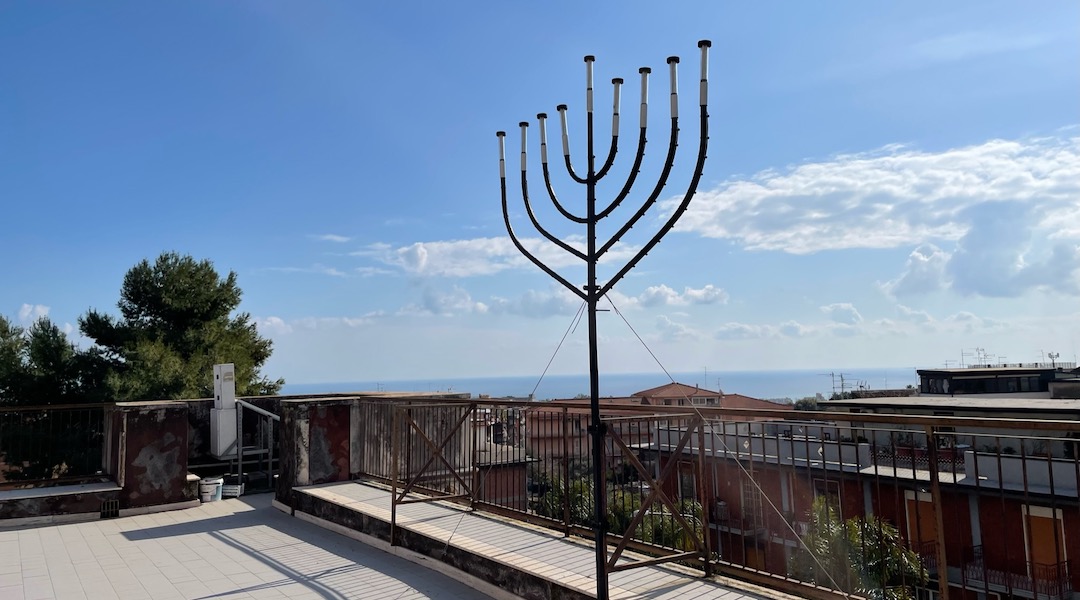
The rooftop of the Castello Leucatia, where the community meets, has a large menorah and a view of the Mediterranean. (David I. Klein)
Catania’s Jewish community members told the Jewish Telegraphic Agency a variety of stories about their Jewish backgrounds. Some came from families that always outwardly identified as Jewish. Others identified the source of family traditions practiced by parents and grandparents who — as descendants of Jews who faced persecution for practicing Judaism — still felt the need to hide aspects of their Jewishness from the public eye.
In the midst of questions about their ancestry, the majority of the Jewish community members have undergone Orthodox conversions. But that hasn’t led to their acceptance.
Benito Triolo, president of the Catania Jewish community, told JTA that he first came to Judaism at the age of 40, thanks to the insight of a Jewish friend in Palermo, Sicily’s capital and most populous city. Working together, they established a Charter of Sicilian Jewry, which aimed to identify and highlight the Jewish heritage of neighborhoods across the island.
While working on that project, Triolo came closer to his own Jewish heritage, and after years of study, he completed an Orthodox conversion through a rabbi in Miami 25 years ago.
Another community member, who was born Alessandro Scuderi but today goes by the name of Yoram Nathan, first felt drawn to Judaism as a child watching news of Israel’s Six-Day War in 1967. At first, he was laughed at by other members of his family — except his grandmother, who happened to have a tradition of lighting eight candles in early winter and baking flat unleavened bread around Easter time.
Decades of study later, Scuderi also completed a formal conversion to Judaism before an Orthodox rabbinic court, or beit din.
Others had more straightforward backgrounds.
“I was born in a Jewish family,” said David Scibilia, the community’s secretary. “Frankly speaking, we were not hiding or deep in the shadows in this part of the country.”
Scibilia said that his father explained to him that he was a Jew as early as the age of 4. Within their own home, they observed holidays and kept Shabbat — no easy task since Italian schools at the time of his childhood in the 1970s had class on Saturdays. He did not eat meat until he was an adult and was able to acquire kosher meat.
He said that his family had maintained their Jewish identity since the days of the Inquisition and married amongst a small group of other similar families.
“I was a Jew, but not part of any community,” Scibilia said. “Just my family was my community.”
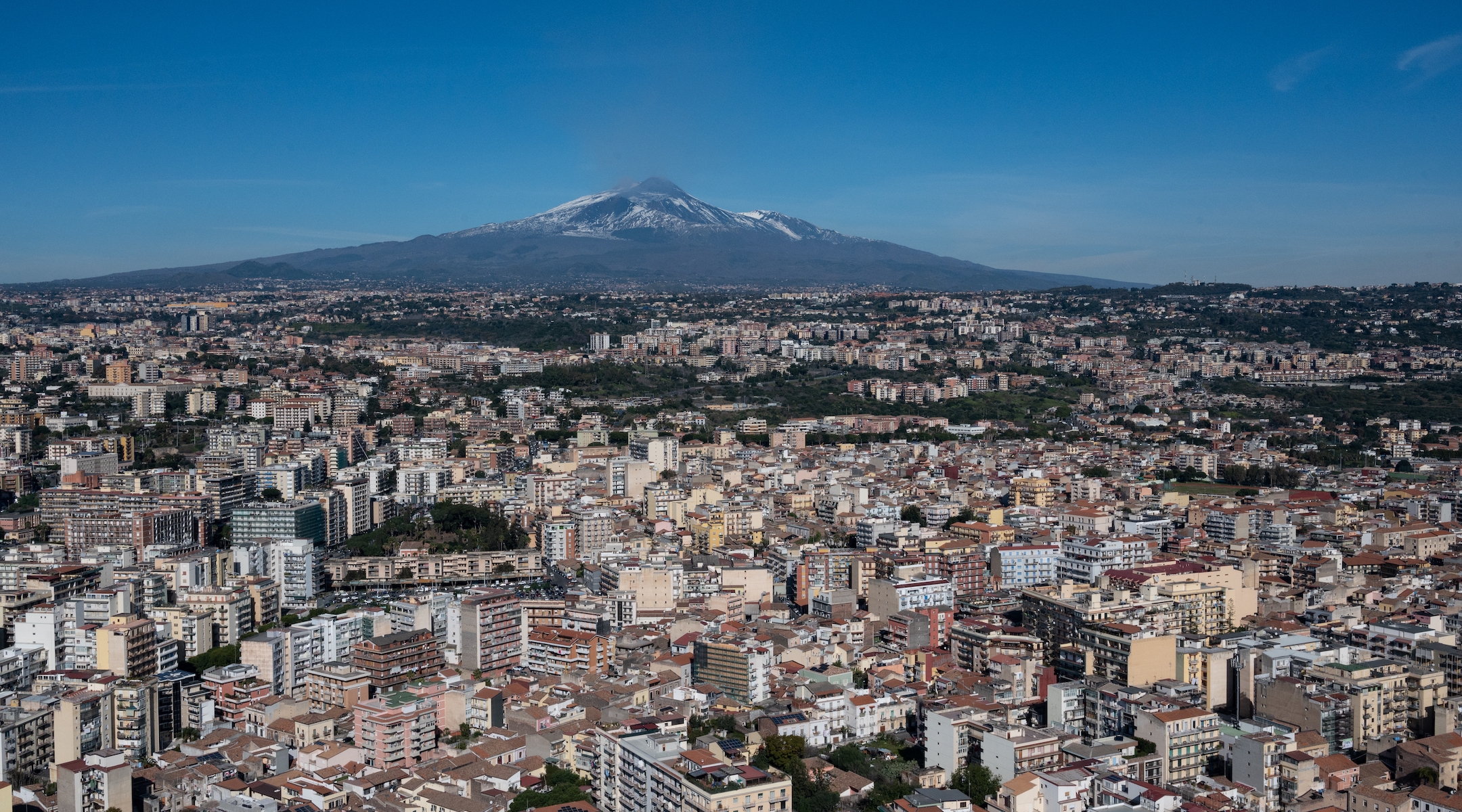
An aerial view of the city of Catania shows the Mt. Etna volcano in the background, Jan. 28, 28, 2022. (Fabrizio Villa/Getty Images)
Scibilia explained that once he had a child of his own, he realized he did not want her to have the same lonely Jewish experience. But when he reached out to UCEI, he said he found the door to organized Jewish life shut. Earning membership in Jewish community organizations across Western Europe involves a strict vetting process, and many groups require applicants to prove, according to varying standards, that their mother was Jewish.
Scibilia’s experience was echoed by Jews outside of the community in Catania and across Italy’s south who talked to JTA — a feeling of neglect or rejection by UCEI for those who fall outside of the norms of Italian Judaism.
UCEI currently recognizes 19 Jewish communities across northern Italy and just one in the south, in Naples, which has jurisdiction over the rest of the southern half of the peninsula and the island of Sicily. The organization recognizes around 28,000 Jews in total across the country.
Scibilia noted that despite his Jewish upbringing, he has multiple certificates of conversion from Orthodox rabbis. The first came from a beit din of American rabbis from who traveled to Syracuse, Sicily, to assess Scibilia and others like him in Sicily. His second comes from the conversion court of the Israeli Chief Rabbinate, which is known for its exacting Orthodox standards.
Both were rejected by Italy’s own Orthodox rabbinate, and he was forced to stand before another rabbinic court in Italy.
“I have at this moment — don’t start to laugh — three documents that prove that I am a Jew, two Ketubahs [marriage contracts] for my wedding, and so on, again and again and again,” Scibilia said.
Others’ experiences in the region have been even more fraught, he said.
“The problem in Italy [is] that if you try to study with any rabbi here, you can study for 20 years, maybe you can die even before you reach the end of the tunnel,” he said. “From my point of view, they are playing with the spirituality of these people.”
In a statement last year, UCEI called the the Catanians “a phantom ‘Jewish community’” and accused them of “misleading the local institutions and deluding believers and sympathizers into adhering to traditional religious rites, never actually recognized or authorized by the Italian rabbinical authority.”
“Between UCEI and the Italian republic is an agreement signed in ‘87,” Di Segni said. “This law means everything about Jewish communities in Italy is through the Union Jewish community in Italy.”
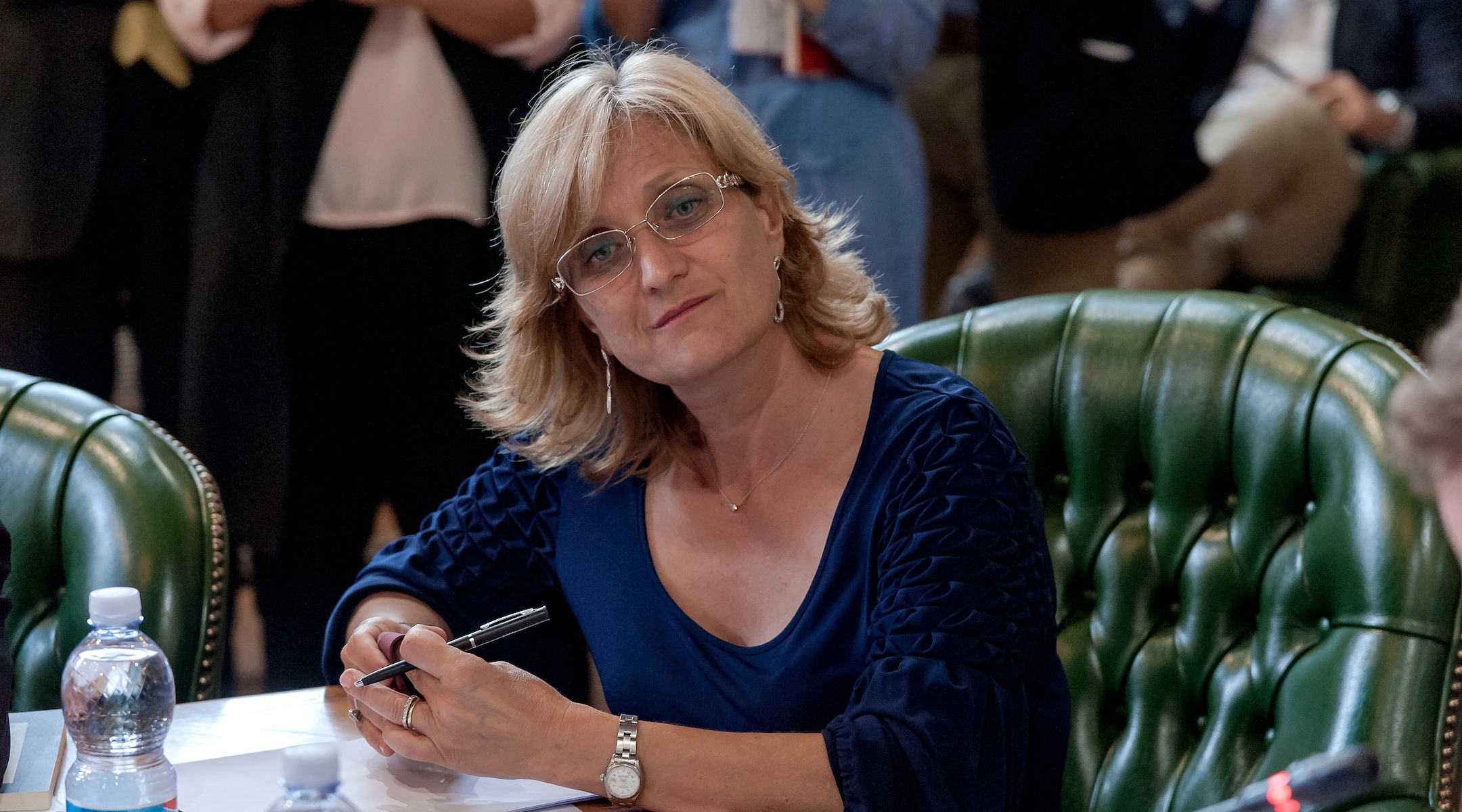
Noemi Di Segni, shown in Rome in 2017, is president of the Union of Jewish Communities in Italy. (Stefano Montesi/Corbis via Getty Images)
Triolo said he isn’t too concerned about UCEI’s recognition.
“Ours is a process of refounding old communities that existed as early as 200 and up to 1492,” Triolo said. “Our recognition is already in our history. At that time the UCEI did not exist. We were there and we simply returned!”
No one knows when Jews first arrived in Sicily, but the Talmud tells a story that claims Rabbi Akiva, a well-known early rabbinic sage, visited the island in the early second century and told of a small Jewish community in Syracuse. Some historians believe the Roman writer Caecilius Calactinus — who was born in a town near Messina in the first century B.C.E — to have been of Jewish origin.
All agree that over the course of history, Sicily’s Jews watched as the island was traded among the Greeks, Carthaginians, Romans, Arabs, Normans and half a dozen other empires. The narrative has also long been that Jewish life there ended five centuries ago, under Spanish rule.
The Spanish empire’s Jews suffered the same fate as Jews from the Iberian peninsula, who would become known to the world as Sephardim when they were expelled in 1492.
The descendents of Spain — and Sicily — spread throughout the world, establishing communities in North Africa, throughout the Ottoman empire, in the Netherlands and ultimately the British Isles and North America, as it was believed that Judaism faded away in their homelands.
Catania’s Jews disagree, arguing that many Jews practiced their religion over the centuries, in secret.
Triolo and others in the community formally inaugurated their synagogue in October. It was furnished with Torah scrolls donated by the Ohev Sholom synagogue in Washington, D.C.
The synagogue is situated in the tower of the Castello Luecatia, an early 20th-century structure built by a merchant believed to be of Jewish origin. The building was granted to the community by the city’s municipality.
“So they had the people, they had a synagogue, but they needed somebody to teach,” Ventura said.
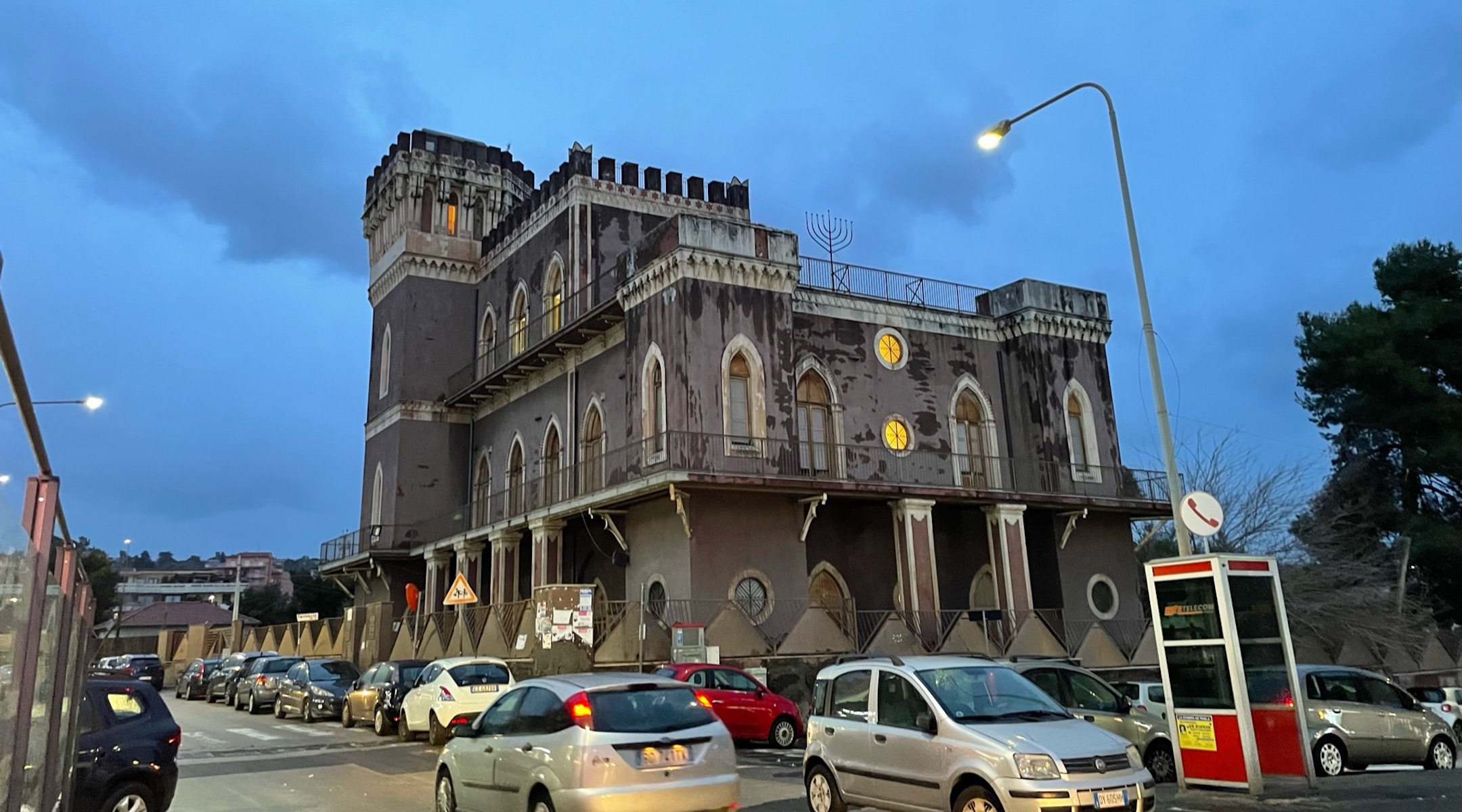
The community meets in the Castello Luecatia, an early 20th-century structure built by a merchant believed to be of Jewish origin. (David I. Klein)
Ventura, who is Orthodox, might be the island’s first permanent working rabbi in over 500 years, but it’s not his first time working with Bnei Anusim.
Back in his native Brazil, Ventura was the leader of the Synagogue Without Borders, an organization through which he served 15 communities in Brazil’s north that were made up of descendants of Jews who came with the first Portuguese colonists to South America and who ultimately had to hide their identity as the Inquisition spread to the New World.
In Brazil, he founded synagogues and summer camps and built mikvahs and yeshivas across the country’s north. Since 2015, he has facilitated the conversion of hundreds of Bnei Anusim, bringing them back into the fold of mainstream Orthodox Judaism.
His work there put him in conflict with Brazil’s Jewish establishment, too. But Ventura is unfazed.
“I am a teacher since I was 21 years old,” he said. “Now I am 49, along with my wife. It’s one of the things we love to do, and know how to do. To teach Jewish philosophy, to teach Torah, to teach Tanakh, to teach the story of the Jews in Brazil, and now we are starting to teach the story of the Jews in Italy, the story of the Inquisition, etcetera.”
In Castello Leucatia, he leads Shabbat services with the energy of a gospel preacher, pausing between prayers to explain a verse, teach a new tune, welcome latecomers, or simply to allow the congregation to talk.
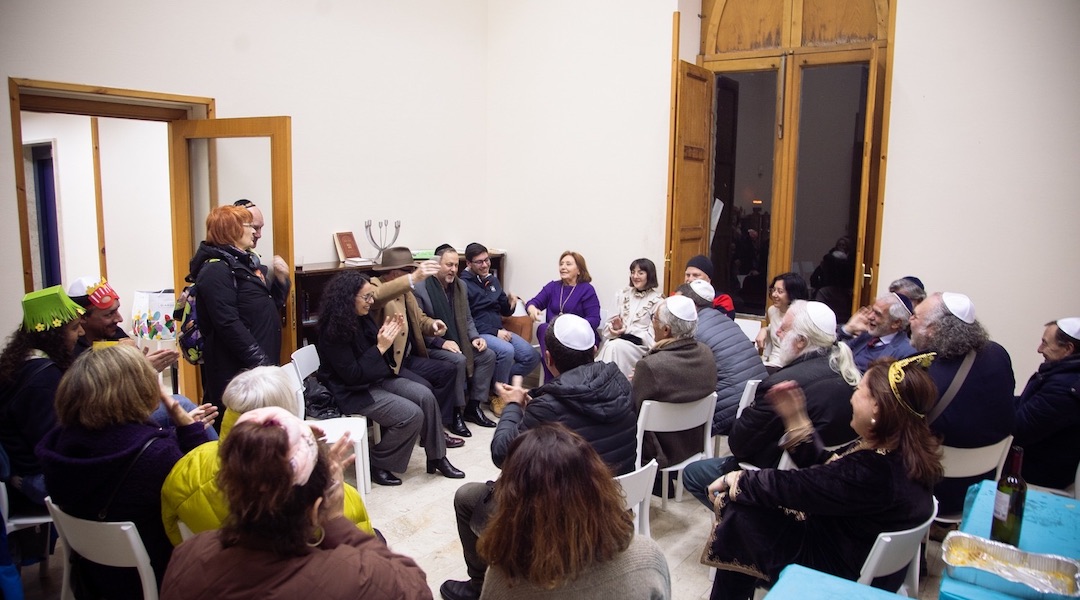
Catania community members are shown at a recent gathering. (David I. Klein)
“This is what’s most important,” he said during one such lull on a recent Friday night. “That they get to talk and be a community.”
Ventura had organized a Shabbat event for other Jews across Italy — from Naples to Turin — who shared his belief that the future of Judaism was in communities like the one in Catania.
“Our point of view of Judaism is that we have to be a part of society, we don’t have to insulate ourselves, we believe that Judaism has a lot to contribute to society,” Ventura said. “In Brazil, we have a lot of connections with people from the periphery, in the favela and other communities, immigrants, Indians, etcetera. So that is something we want to establish here, to teach the people a Judaism that brings good things to the wider society.”
Ventura isn’t the only one working with such communities in southern Italy. Across the Strait of Messina, Jewish life has also been on the rise in Calabria — the toe of Italy’s boot — thanks to an American-born rabbi named Barbara Aiello.
Aiello, though raised in Pittsburgh, is of Calabrian descent. She returned to the land of her ancestors in the early 2000s and began working with the Bnei Anusim there, ultimately establishing a synagogue called Ner Tamid del Sud, meaning “eternal light of the south.”
“Until now, nobody took care of Judaism in the south of Italy,” Scibilia said while looking out at the Mediterranean from the terrace of Castello Leucatia.
JTA has documented Jewish history in real-time for over a century. Keep our journalism strong by joining us in supporting independent, award-winning reporting.
